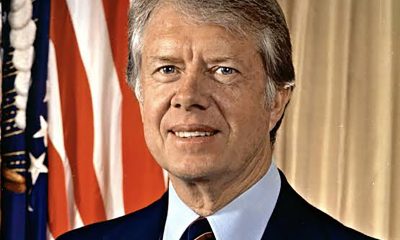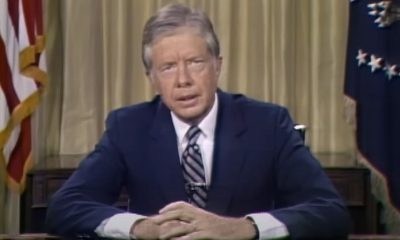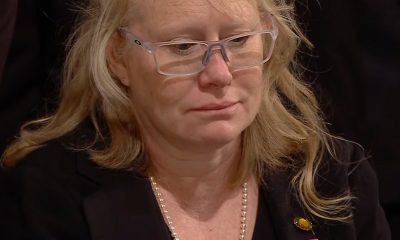Politics
Former President Jimmy Carter has entered hospice care
Carter Center made announcement on Saturday
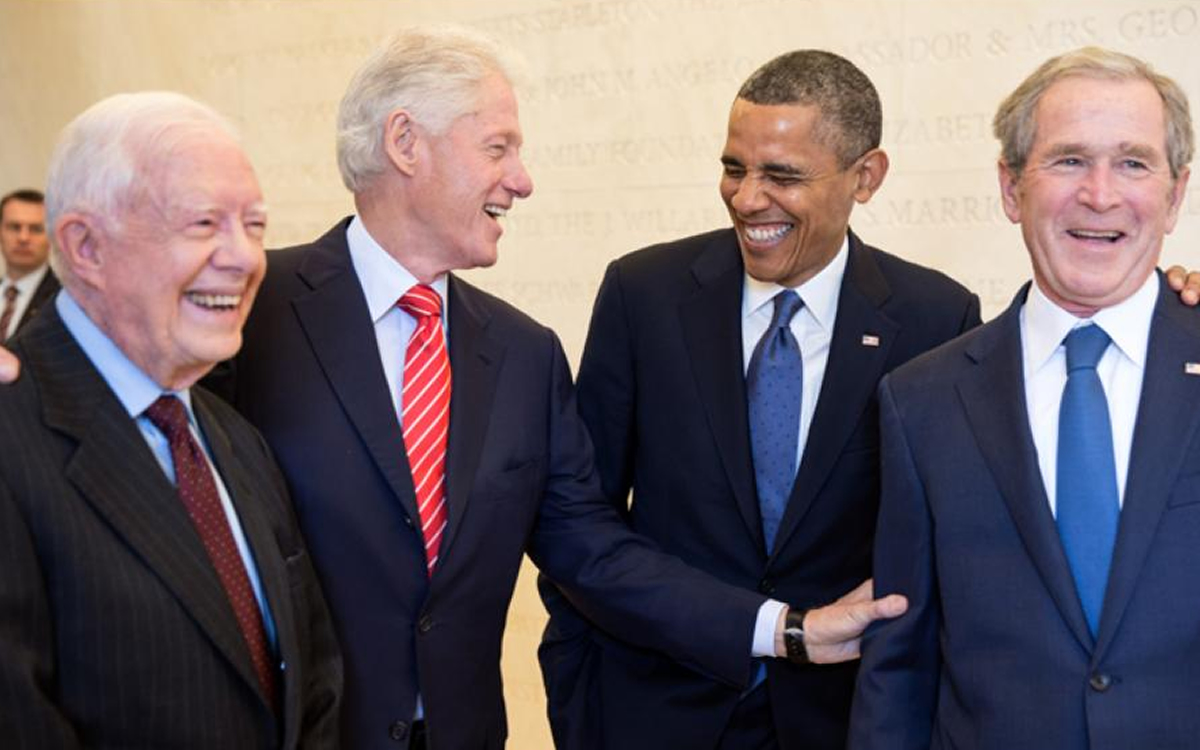
Former President Jimmy Carter has elected to receive hospice at his home in Plains, Ga., according to the announcement by the Carter Center in Atlanta. The 98-year-old former president, who has been in ill health recently and hospitalized several times, decided to spend his remaining time at home with his family.
The Carter Center said that the former president had elected to decline additional medical intervention and that he has the full support of his family and his medical team.
The former president’s grandson, former Georgia state Sen. Jason Carter tweeted: “I saw both of my grandparents yesterday. They are at peace and — as always — their home is full of love. Thank you all for your kind words”
I saw both of my grandparents yesterday. They are at peace and—as always—their home is full of love. Thank you all for your kind words https://t.co/9rhG61sZEV
— Jason Carter (@SenatorCarter) February 18, 2023
Carter became the oldest living former U.S. chief executive after the death at age 94 of former President George H.W. Bush on Nov. 30, 2018. He was diagnosed with cancer in Aug. 2015 — melanoma that had spread to his liver and brain — but was later declared cancer-free. In 2019, he also suffered a black eye in a fall and was later hospitalized with a fractured pelvis due to a separate fall.
Carter’s 76-year-long marriage makes him the longest-married U.S. president on record.
The 39th president of the U.S., he served from 1977-1981. After leaving office in 1982, he and his wife Rosalynn founded the Carter Center, a nonprofit organization dedicated to improving the lives of people around the globe. The former president was awarded the Nobel Peace Prize in 2002 for his life-long advocacy for human rights.
The announcement by the Nobel Committee stated that the committee decided to award the Nobel Peace Prize for 2002 to Carter, “for his decades of untiring effort to find peaceful solutions to international conflicts, to advance democracy and human rights, and to promote economic and social development.”
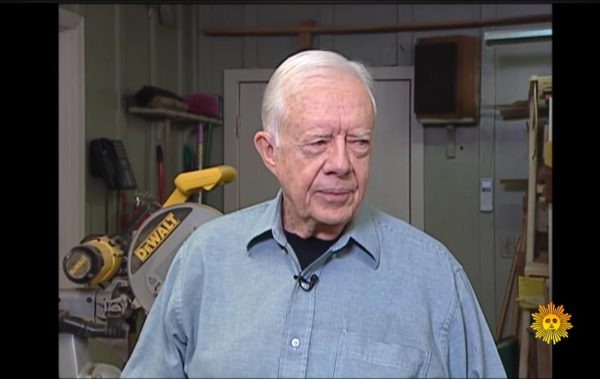
Modest beginnings
Born Oct. 1, 1924, at the Wise Sanitarium [hospital] in his hometown of Plains, Ga., where he was raised on his parent’s peanut farm, Carter’s decades of public service commenced after his graduation from the U.S. Naval Academy in 1946 and he began his service as a submariner.
Carter left naval service after the death of his father in 1953 taking over the Carter family business in what was then a segregated Georgia with sharp lines between Blacks and Whites. He was an early supporter of the nascent civil rights movement and became an activist within the Democratic Party, a leading voice of change to end racial segregation.
First elected to office in 1963, Carter served as a state senator until 1967. In 1970 he successfully ran for governor, winning the office and then going on to serve until 1975. Like most progressive Democrats of the era, Carter was appalled by U.S. foreign policy in Vietnam and then by the scandal of Watergate that took down the Republican administration of President Richard Nixon leading to the president’s resignation in August 1974.
Previous to the Watergate scandal in 1972, Carter was selected to lead as chair of the Democratic Governor’s Campaign Committee. This position gave him access to key Democrats nationwide, and the major Democratic gains in the first post-Watergate election allowed Carter to raise his visibility nationally.
Presidential politics
Although a relative unknown outside of Georgia and within the leadership of the Democratic Party, Carter was able to parlay voter fatigue and the public’s response to the twin nightmares of Vietnam and Watergate, that had shattered public confidence in government into setting up his run against incumbent Republican President Gerald Ford.
Robert A. Strong, professor of politics at Washington and Lee University and a visiting fellow at the University of Virginia’s Miller Center noted: [In the 1976 presidential race] Americans gravitated toward leaders who were outside the Washington sphere. Answering the nation’s need, Carter’s slogan was “A Leader, For A Change.” Nine other Democrats were seeking the nomination in 1976, most of them better known than Carter.
Early support of gay rights
During a campaign stop on May 21, 1976, Carter was giving a fundraising campaign speech at the Hilton hotel in San Francisco when he met local gay rights activist Harvey Milk. The moment was caught by famed San Francisco-based gay photographer Donald C. Eckert as Carter shook Milk’s hand.
According to Jimmy Carter Presidential Library researcher Dale Dancis, Eckert, speculated that “Carter and his aides had no idea who Harvey was at the time. (Milk) had scraped together the $100 or so for the fund-raising dinner so he could meet Carter.”
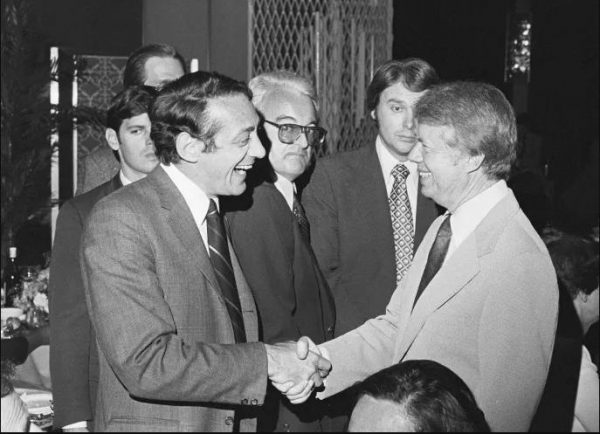
(Photo Credit: Donald C. Eckert/ National Archives and Records Administration and Harvey Milk Foundation)
The Jimmy Carter Presidential Library has a recording of Carter’s speech from that night, which doesn’t mention gay rights. However, Carter spoke out in support of gay rights at the news conference he held just before the fund raiser, saying he would sign New York Democratic Congresswoman Bella Abzug’s Equality Act amendment to the 1964 Civil Rights Act if it reached his desk. “I will certainly sign it, because I don’t think it’s right to single out homosexuals for special abuse or special harassment,” he said.
In the outcome of the 1976 presidential election, Carter narrowly defeated Ford, in part due to the latter’s pardoning of his predecessor president Nixon, but also as the inflation rate in 1976 topped 5.76 percent and the American economy had significantly slowed.
Washington and Lee’s professor Strong wrote: “The election was very close. Ford’s strategy was to try to win five of eight elector-rich states: California, Illinois, Michigan, New Jersey, New York, Ohio, Pennsylvania and Texas. He won four, but not five. Carter won with an interesting coalition of the entire Old South (excepting conservative Virginia) and northern industrial powers such as New York and Pennsylvania.”
Carter later factored into a gay rights campaign by Milk, when, as an elected city supervisor for the Castro (District 5) in San Francisco in 1978, wrote the president asking for his support in defeating ballot Proposition 6, which would have banned gay and lesbian individuals from working in the California public school systems as teachers or staff.
Proposition 6, was also known as the Briggs Initiative — named after Republican state Sen. John Briggs who had authored the legislation. In his letter Milk stressed that he hoped that the president would oppose the Briggs Initiative and “take a leadership role in defending the rights of gay people.”
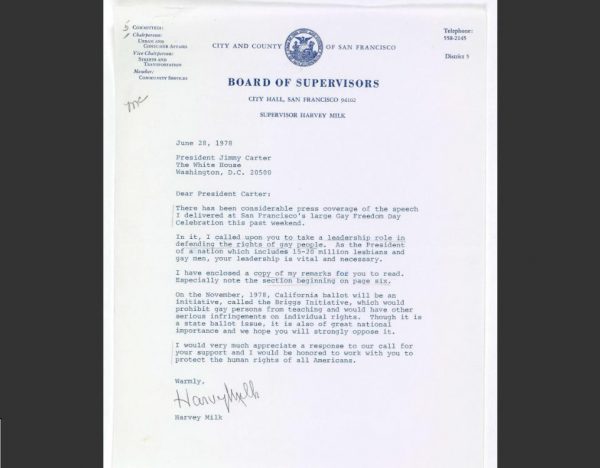
A couple of days before sending the letter Milk expressed his frustration over what he perceived as inaction by the Carter White House on gay rights in a speech he gave on June 28, 1978, that later was known as the “Hope Speech.” Milk targeted Sen. Briggs and Florida resident and anti-gay activist Anita Bryant for her national Save Our Children campaign which labeled gay and lesbian Americans as deviants.
“… There are some 15 to 20 million lesbians and gay men in this country listening and listening very carefully. Jimmy Carter, when are you going to talk about their rights?” Milk told the crowd in front of San Francisco City Hall that bright June morning.
In his letter to Carter after the speech Milk wrote: “In it, [Milk’s speech] I called upon you to take a leadership role in defending the rights of gay people. As the president of a nation which includes 15-20 million lesbians and gay men, your leadership is vital and necessary.”
Camp David Accords and the push for peace in the Middle East
Carter’s presidency saw the creation of two new federal cabinet-level roles — the Departments of Energy and Education. Carter also focused efforts on bringing peace to the troubled regions in the Middle East.
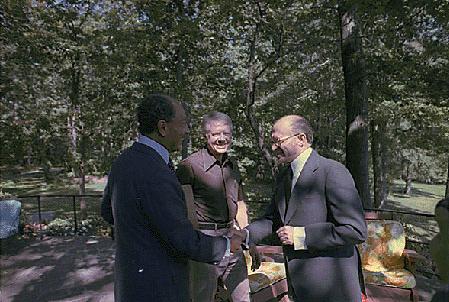
The Camp David Accords, signed by Carter, Egyptian President Anwar Sadat, and Israeli Prime Minister Menachem Begin in September 1978, established a framework for a historic peace treaty concluded between Israel and Egypt the next spring in March 1979.
Carter along with his Secretary of State, Cyrus Vance, pursued intensive negotiations with Arab and Israeli leaders, hoping to reconvene the Geneva Conference, which had been established in December 1973 to seek an end to the Arab-Israeli dispute after decades of bloody and costly conflict.
His presidency however would be marred by a series of events that critics would charge showed Carter’s inability to govern effectively as well as manage the massive and somewhat unwieldy Federal government. 1979 proved to be challenging to Carter as he was confronted by the oil crisis brought about by the revolution in Iran that toppled Shah Mohammad Reza Pahlavi and installed a fundamentalist Islamic regime, the Three Mile Island nuclear accident, the Nicaraguan revolution and the Soviet invasion of Afghanistan.
Ultimately it was the revolution in Iran and the take-over of the U.S. Embassy in Tehran on Nov. 4, 1979, and the hostage-taking of 52 U.S. diplomats and citizens by militant Iranian college students and youths supported by the government of Ayatollah Khomeini, that proved to leave a negative impact on Carter’s chances for reelection.
The campaign and election of 1980
Writing about that campaign, Strong noted: “Three days after the embassy takeover in Iran, Sen. Edward Kennedy of Massachusetts announced his candidacy for the Democratic presidential nomination. Incumbents rarely face a challenge from within their own party, but Kennedy was encouraged by Carter’s weak poll ratings. When told of the Kennedy challenge, Carter snapped to a congressman, who later spoke to reporters: “I’ll whip his ass.” Kennedy came close to defeating Carter as the party split into two wings.”
In the fall of 1980 Republican nominee former California Gov. Ronald Reagan won in an electoral landslide. Many political observers an historians believe that Carter’s record in office despite his successes with Middle East negotiations for peace belied the fact that he was a below-average president.
The final straw in dooming his chances for a second term for his presidency some historians said was that in addition to his seeming inability to gain the release of the American hostages held in Tehran, the final debate between the president and Reagan capped what would become his defeat at the polls.
Reagan was an infinitely superior television candidate. Someone asked Carter a question about the arms race with the Soviets, and he claimed that he had helped decide policy towards it by discussing it with Amy, his eight-year-old daughter. When Carter acted querulous and sounded shrill, Reagan turned to him and said in a mock tone of exasperation, “There you go again.” At the end of the debate, Reagan looked into the camera expertly and asked viewers, “Are you better off than you were four years ago?” The next day, Carter was stunned at the latest poll numbers-the very bottom had dropped out.
The Carter Center and post-presidency career
Carter’s years after leaving the White House has been filled with years of work dedicated to his passion for the advancement of human rights, peace negotiations, monitor elections, and advancing disease prevention and eradication in developing nations. Much of that charitable work advanced by the Carter Center’s efforts in more than 65 developing countries.
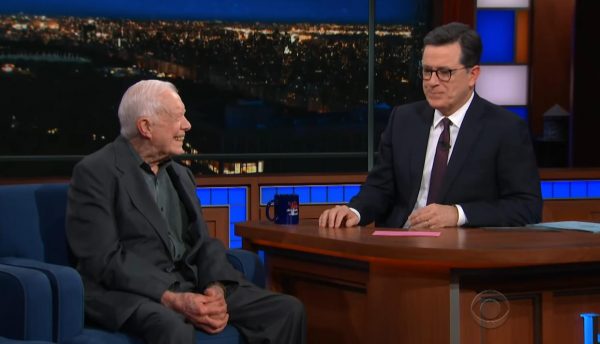
A published author, Carter has written over 30 books, ranging from political memoirs to poetry, and he and his wife Rosalynn are also celebrated for their hands on work with the nonprofit organization Habitat for Humanity, a nonprofit organization dedicated to providing home ownership opportunities to low-income families.
Both have been publicly documented lending their labor and time on the construction of new homes by Habitat for Humanity.
Carter has continued to lend support and allyship to the LGBTQ community. During a book tour promoting his book, “A Full Life: Reflections at Ninety,” speaking with HuffPost Live in July 2018, the former president was asked about gay marriage said he believes “Jesus would approve of gay marriage.”
“I think Jesus would encourage any love affair if it was honest and sincere and was not damaging to anyone else and I don’t see that gay marriage damages anyone else,” Carter who describes himself as a born-again Christian said adding though as a caveat churches that disagree with same-sex marriage should not have to perform them.
Jimmy Carter says Jesus would approve of marriage equality:
Carter is still praying for Donald Trump
From 2006: Jimmy Carter on life after the White House
Politics
George Santos sentenced to 87 months in prison for fraud case
Judge: ‘You got elected with your words, most of which were lies.’
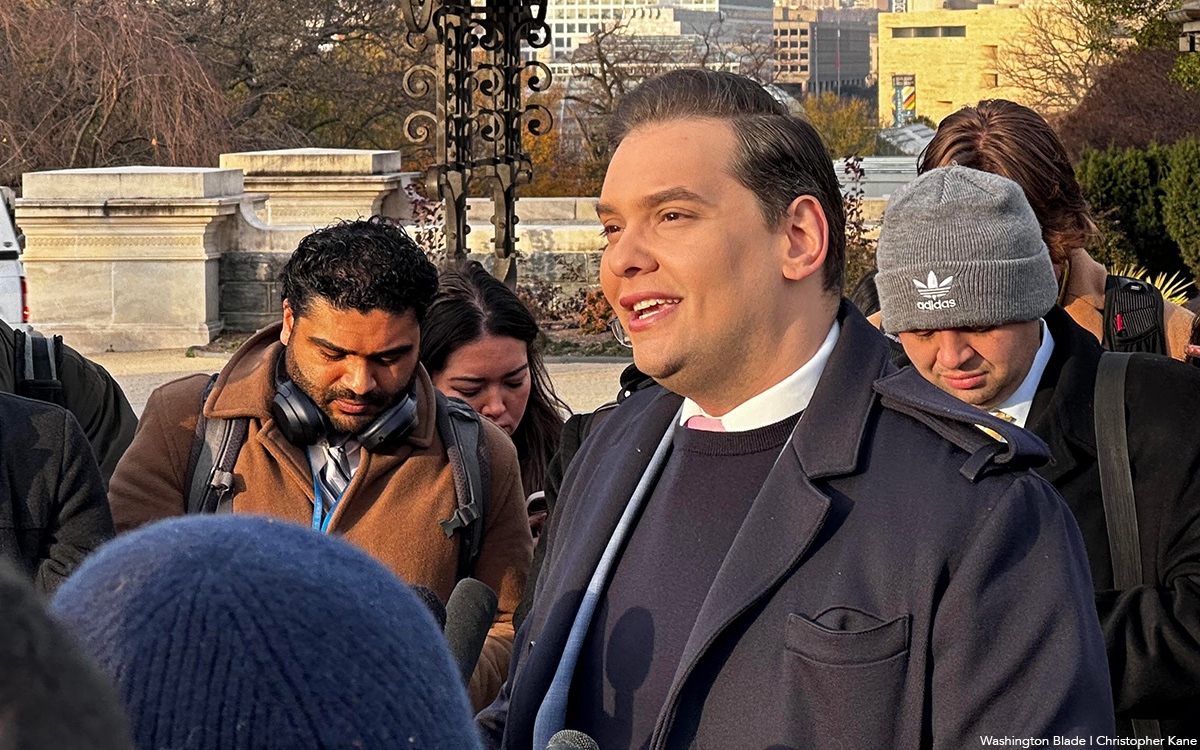
Disgraced former Republican congressman George Santos was sentenced to 87 months in prison on Friday, after pleading guilty last year to federal charges of wire fraud and aggravated identity theft.
“Mr. Santos, words have consequences,” said Judge Joanna Seybert of the U.S. District Court for the Eastern District of New York. “You got elected with your words, most of which were lies.”
The first openly gay GOP member of Congress, Santos became a laughing stock after revelations came to light about his extensive history of fabricating and exaggerating details about his life and career.
His colleagues voted in December 2023 to expel him from Congress. An investigation by the U.S. House Ethics Committee found that Santos had used pilfered campaign funds for cosmetic procedures, designer fashion, and OnlyFans.
Federal prosecutors, however, found evidence that “Mr. Santos stole from donors, used his campaign account for personal purchases, inflated his fund-raising numbers, lied about his wealth on congressional documents and committed unemployment fraud,” per the New York Times.
The former congressman told the paper this week that he would not ask for a pardon. Despite Santos’s loyalty to President Donald Trump, the president has made no indication that he would intervene in his legal troubles.
Congress
Democratic lawmakers travel to El Salvador, demand information about gay Venezuelan asylum seeker
Congressman Robert Garcia led delegation

California Congressman Robert Garcia on Tuesday said the U.S. Embassy in El Salvador has agreed to ask the Salvadoran government about the well-being of a gay asylum seeker from Venezuela who remains incarcerated in the Central American country.
The Trump-Vance administration last month “forcibly removed” Andry Hernández Romero, a stylist who asked for asylum because of persecution he suffered because of his sexual orientation and political beliefs, and other Venezuelans from the U.S. and sent them to El Salvador.
The White House on Feb. 20 designated Tren de Aragua, a Venezuelan gang, as an “international terrorist organization.” President Donald Trump on March 15 invoked the Alien Enemies Act of 1798, which the Associated Press notes allows the U.S. to deport “noncitizens without any legal recourse.”
Garcia told the Washington Blade that he and three other lawmakers — U.S. Reps. Maxwell Alejandro Frost (D-Fla.), Maxine Dexter (D-Ore.), and Yassamin Ansari (D-Ariz.) — met with U.S. Ambassador to El Salvador William Duncan and embassy staffers in San Salvador, the Salvadoran capital.
“His lawyers haven’t heard from him since he was abducted during his asylum process,” said Garcia.
The gay California Democrat noted the embassy agreed to ask the Salvadoran government to “see how he (Hernández) is doing and to make sure he’s alive.”
“That’s important,” said Garcia. “They’ve agreed to that … we’re hopeful that we get some word, and that will be very comforting to his family and of course to his legal team.”

Garcia, Frost, Dexter, and Ansari traveled to El Salvador days after House Oversight and Government Reform Committee Chair James Comer (R-Ky.) and House Homeland Security Committee Chair Mark Green (R-Tenn.) denied their request to use committee funds for their trip.
“We went anyways,” said Garcia. “We’re not going to be intimidated by that.”
Salvadoran President Nayib Bukele on April 14 met with Trump at the White House. U.S. Sen. Chris Van Hollen (D-Md.) three days later sat down with Kilmar Abrego Garcia, a Maryland man who the Trump-Vance administration wrongfully deported to El Salvador on March 15.
Abrego was sent to the country’s Terrorism Confinement Center, a maximum-security prison known by the Spanish acronym CECOT. The Trump-Vance administration continues to defy a U.S. Supreme Court ruling that ordered it to “facilitate” Abrego’s return to the U.S.
Garcia, Frost, Dexter, and Ansari in a letter they sent a letter to Duncan and Secretary of State Marco Rubio on Monday demanded “access to” Hernández, who they note “may be imprisoned at” CECOT. A State Department spokesperson referred the Blade to the Salvadoran government in response to questions about “detainees” in the country.
Garcia said the majority of those in CECOT who the White House deported to El Salvador do not have criminal records.
“They can say what they want, but if they’re not presenting evidence, if a judge isn’t sending people, and these people have their due process, I just don’t understand how we have a country without due process,” he told the Blade. “It’s just the bedrock of our democracy.”

Garcia said he and Frost, Dexter, and Ansari spoke with embassy staff, Salvadoran journalists and human rights activists and “anyone else who would listen” about Hernández. The California Democrat noted he and his colleagues also highlighted Abrego’s case.
“He (Hernández) was accepted for his asylum claim,” said Garcia. “He (Hernández) signed up for the asylum process on an app that we created for this very purpose, and then you get snatched up and taken to a foreign prison. It is unacceptable and inhumane and cruel and so it’s important that we elevate his story and his case.”
The Blade asked Garcia why the Trump-Vance administration is deporting people to El Salvador without due process.
“I honestly believe that he (Trump) is a master of dehumanizing people, and he wants to continue his horrendous campaign to dehumanize migrants and scare the American public and lie to the American public,” said Garcia.
The State Department spokesperson in response to the Blade’s request for comment referenced spokesperson Tammy Bruce’s comments about Van Hollen’s trip to El Salvador.
“These Congressional representatives would be better off focused on their own districts,” said the spokesperson. “Instead, they are concerned about non-U.S. citizens.”
Congress
Goodlander endorses Pappas’s Senate bid
Announcement puts gay congressman on the path to securing his party’s nomination

U.S. Rep. Maggie Goodlander (D-N.H.) on Thursday announced she will not run to represent her state in the U.S. Senate, endorsing gay U.S. Rep. Chris Pappas’s (D-N.H.) bid for the seat of retiring U.S. Sen. Jeanne Shaheen, putting him on the path to secure the Democratic nomination.
“We are in the fight of our lifetimes right now, of a moment of real crisis and challenge,” she said. “I feel humbled and grateful to so many people across our state who have encouraged me to take a look at the U.S. Senate, and after a lot of thought and conversations with people I love and people I respect and people who I had never met before, who I work for in this role right now, I’ve decided that I’m running for re election in the House of Representatives.”
When asked by a reporter from the ABC affiliate station in New Hampshire whether she would endorse Pappas, Goodlander said, “Yes. Chris Pappas has been amazing partner to me in this work and for many years. And I really admire him. I have a lot of confidence in him.”
She continued, “He and I come to this work, I think with a similar set of values, we also have really similar family stories. Our families both came to New Hampshire over 100 years ago from the very same part of northern Greece. And the values that he brings to this work are ones that that I really, really admire. So I’m proud to support him, and I’m really excited to be working with him right now because we’ve got a lot of work to do.”
Today in Salem @MaggieG603 tells @WMUR9 she is not running for U.S. Senate & endorses @ChrisPappasNH #NHPolitics #NHSen #NH02 #WMUR pic.twitter.com/W2CMrhRuIC
— Adam Sexton (@AdamSextonWMUR) April 17, 2025
“Maggie Goodlander has dedicated her career to service, and we can always count on her to stand up to powerful interests and put people first,” Pappas said in a post on X. “I’m so grateful to call her my friend and teammate, and I’m proud to support her re-election and stand with her in the fights ahead.”
Earlier this month, former New Hampshire Gov. Chris Sununu, a Republican, announced he would not enter the Senate race, strengthening the odds that Democrats will retain control of Shaheen’s seat.
-

 Federal Government3 days ago
Federal Government3 days agoHHS to retire 988 crisis lifeline for LGBTQ youth
-

 Opinions3 days ago
Opinions3 days agoDavid Hogg’s arrogant, self-indulgent stunt
-

 District of Columbia2 days ago
District of Columbia2 days agoD.C. police seek help in identifying suspect in anti-gay threats case
-

 Virginia3 days ago
Virginia3 days agoGay talk show host wins GOP nom for Va. lieutenant guv

